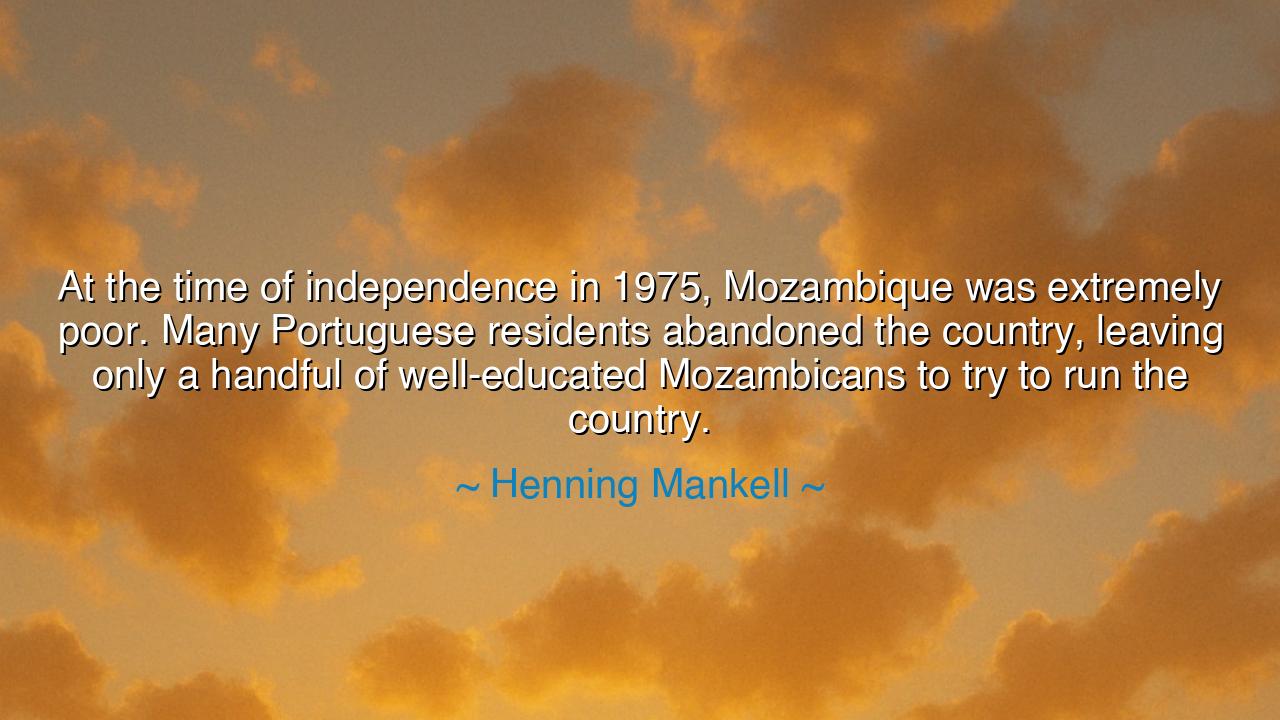
At the time of independence in 1975, Mozambique was extremely
At the time of independence in 1975, Mozambique was extremely poor. Many Portuguese residents abandoned the country, leaving only a handful of well-educated Mozambicans to try to run the country.






“At the time of independence in 1975, Mozambique was extremely poor. Many Portuguese residents abandoned the country, leaving only a handful of well-educated Mozambicans to try to run the country.” Thus spoke Henning Mankell, the Swedish novelist and humanitarian, whose heart was bound not only to words but to Africa — to its struggles, its dignity, and its rebirth. In this single reflection, he captures a moment both tragic and noble: the dawn of independence, when a nation newly free found itself standing alone, wounded yet unbroken, staring into the uncertain light of its own destiny. His words are not merely historical; they are a meditation on the cost of freedom — the price every people must pay to reclaim the right to govern themselves.
The origin of this quote lies in the story of Mozambique, a land long under the rule of Portuguese colonial power. For centuries, its wealth — ivory, gold, and human labor — was taken across the sea, leaving behind a people denied education, autonomy, and dignity. When the winds of liberation swept across Africa in the twentieth century, Mozambique, too, rose up. After years of fierce struggle led by FRELIMO — the Front for the Liberation of Mozambique — independence came in 1975. Yet, as Mankell observed, it came at a terrible price. The Portuguese settlers, many of whom had held positions of administration, trade, and governance, fled overnight. Schools were empty. Hospitals were silent. Farms and offices were abandoned. What remained was a free nation — but one left to rebuild from the ashes, guided by only a few who had known the workings of the world beyond their villages.
In Mankell’s words, we hear not condemnation, but sorrow — and admiration. For independence, though glorious, is never easy. It demands not only courage to fight for freedom, but wisdom to build afterward. A chain can be broken in a day; but to learn again how to walk without it — that is the labor of generations. Mozambique, like so many nations before it, found itself caught between liberation and survival. Its leaders faced famine, civil war, and the wreckage of an economy designed not to serve the people, but to exploit them. Yet through all this, there was also resilience — the quiet strength of those few well-educated Mozambicans, men and women who refused to let the dream of independence die.
History offers many such moments — the bitter dawn after victory, when the euphoria fades and the weight of freedom settles on weary shoulders. We see it in India, when after centuries of British rule, the nation stood free but divided by partition and poverty. We see it in South Sudan, the world’s newest country, born with hope yet beset by chaos. Each story, like Mozambique’s, reminds us that independence is not an ending, but a beginning — the birth of responsibility. It is the moment when a people must turn from fighting their oppressor to mastering themselves. And that is a far greater struggle.
In Henning Mankell’s telling, there is also compassion for those left behind — not only the people, but the land itself. He lived for many years in Mozambique, running a theater in Maputo, and he saw how culture became the soul’s weapon in rebuilding what was lost. When education was scarce, art became education; when resources were few, community became wealth. The people’s independence was no longer defined by the absence of foreign rule, but by their determination to think, to dream, to create anew. Mankell saw in them the same fire that has always driven humankind forward — the will to rise again, even from ruin.
Thus, the meaning of this quote extends beyond the boundaries of Mozambique. It is a lesson to all who fight for freedom, whether nations or individuals: independence is not granted by the fall of one master, but earned through the labor of self-governance. A people who win freedom must also learn to use it — to build schools where ignorance reigned, to sow unity where division lingered, to cultivate dignity where humiliation once grew. The work of independence does not end with the revolution; it begins there.
Let this be the teaching passed down to future generations: never mistake freedom for ease. Every new beginning carries within it both joy and burden. When you win your independence — in spirit, in thought, or in nation — you must tend to it as a sacred garden. Plant wisdom where chaos threatens. Nurture knowledge where scarcity dwells. And never let despair take root where hope was once sown.
For, as Mankell’s words remind us, though Mozambique was poor in 1975, it was rich in what no colonizer could steal — the will to endure, the courage to rebuild, and the unyielding faith in the promise of independence. Such is the essence of every free people: that even when left with little, they find within themselves the power to create much. And that, in truth, is the greatest wealth a nation can ever possess.






AAdministratorAdministrator
Welcome, honored guests. Please leave a comment, we will respond soon